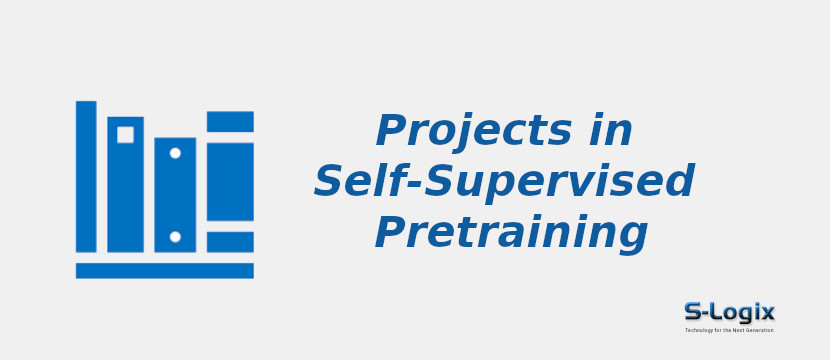Project Background:
Self-supervised pretraining arises from addressing the challenges of limited labeled data and domain-specific knowledge required for effectively training deep learning models. Traditional supervised learning methods heavily rely on large annotated datasets, which are expensive and time-consuming to acquire in domains where labeled data is scarce or costly. Self-Supervised Learning (SSL) offers a solution by leveraging unlabeled data to learn meaningful representations without explicit supervision. By formulating pretext tasks that require the model to predict certain aspects of the input data, such as context prediction, reconstruction, or transformation, SSL enables the extraction of rich and semantically meaningful features from unlabeled data.
These learned representations can be fine-tuned on downstream tasks with limited labeled data leading to improved generalization and performance. The project work encompasses exploring and developing novel self-supervised pretraining techniques, investigating effective pretext tasks, and evaluating the transferability and robustness of learned representations across various domains and tasks. Overall, the project sets the stage for advancing the state-of-the-art in self-supervised learning and addressing the challenges of data scarcity and domain adaptation in deep learning.
Problem Statement
- Traditional supervised learning methods require large amounts of labeled data for training, which may not be readily available or costly to acquire in many domains.
- Domain-Specific Knowledge Requirement for effective feature representation learning, which may not be available or difficult to capture with traditional supervised approaches.
-
Existing supervised methods often suffer from inefficiency in utilizing unlabeled data, leading to under utilization of potentially valuable information.
- Models trained on labeled data may not generalize to unseen domains or tasks, limiting their applicability in real-world scenarios.
- Annotating large datasets can be time-consuming, expensive, and error-prone, particularly for complex tasks or fine-grained annotations.
- Learning meaningful representations directly from raw data without supervision poses a challenge due to the semantic gap between low-level features and high-level semantic concepts.
Aim and Objectives
- To leverage unlabeled data for learning meaningful representations through self-supervised pretraining.
- Develop effective pretext tasks for self-supervised learning.
- Learn semantically meaningful representations from unlabeled data.
- Investigate transferability and generalization of learned representations to downstream tasks.
- Address challenges of data scarcity and domain adaptation in deep learning.
-
Improve efficiency and effectiveness of deep learning models through self-supervised pretraining.
Contributions to Self-Supervised Pretraining
- Utilizing unlabeled data to learn meaningful representations without explicit supervision.
- Developing effective pretext tasks for self-supervised learning.
- Improving transferability and generalization of learned representations to downstream tasks.
- Addressing challenges of data scarcity and domain adaptation in deep learning.
- Enhancing efficiency and effectiveness of deep learning models through self-supervised pretraining.
Deep Learning Algorithms for Self-Supervised Pretraining
- Contrastive Predictive Coding (CPC)
-
Momentum Contrast (MoCo)
-
SimCLR (SimCLRv1 and SimCLRv2)
-
BYOL (Bootstrap Your Own Latent)
-
SwAV (Swapping Assignments between multiple Views)
-
Deep InfoMax (DIM)
-
Rotation Prediction
-
Jigsaw Puzzle
-
Instance Discrimination
-
Colorization
Datasets for Self-Supervised Pretraining
- ImageNet
-
COCO (Common Objects in Context)
-
CIFAR-10
-
CIFAR-100
-
STL-10
-
Places365
-
LSUN (Large-scale Scene Understanding)
-
YFCC100M (Yahoo Flickr Creative Commons 100M)
-
Open Images Dataset
-
JFT (Jigsaw Fit Together)
Software Tools and Technologies
Operating System: Ubuntu 18.04 LTS 64bit / Windows 10
Development Tools: Anaconda3, Spyder 5.0, Jupyter Notebook
Language Version: Python 3.9
Python Libraries:
1.Python ML Libraries:
- Scikit-Learn
- Numpy
- Pandas
- Matplotlib
- Seaborn
- Docker
- MLflow
2.Deep Learning Frameworks:
- Keras
- TensorFlow
- PyTorch
